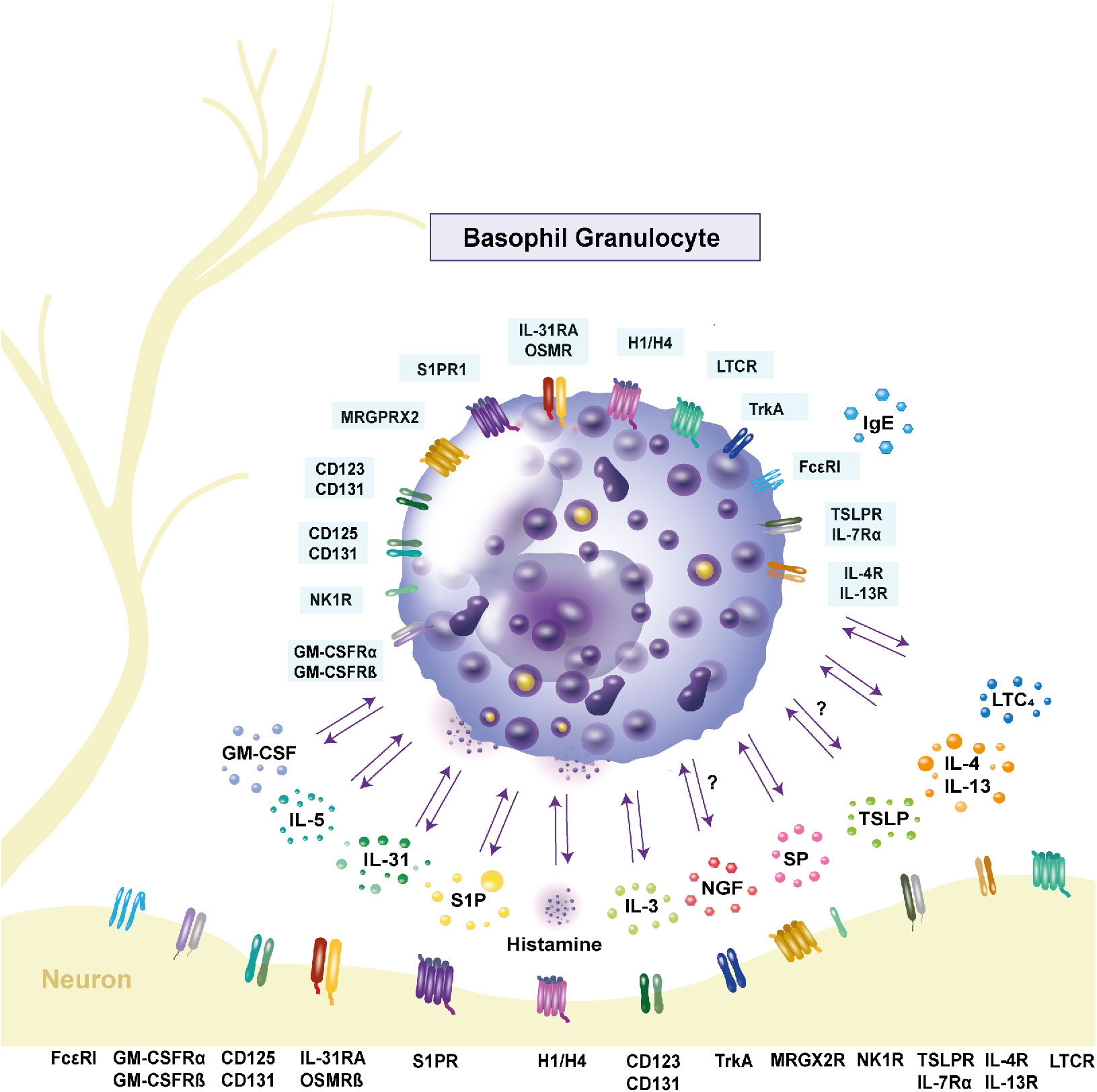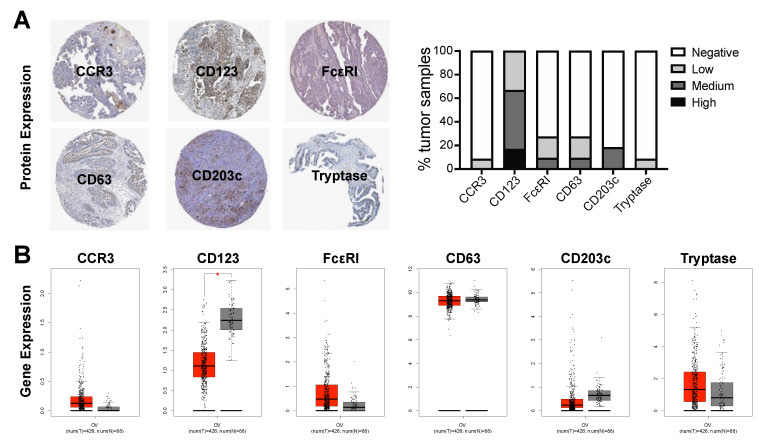CD Antigen (Basophils)
Related Symbol Search List
Immunology Background
Available Resources for CD Antigen (Basophils) Research
Creative BioMart is a leading provider of resources dedicated to basophils CD antigens, to advance scientific knowledge and contribute to the development of novel therapies.
Including antibodies, recombinant proteins, protein pre-coupled magnetic beads, cell and tissue lysates, chromatography reagents, and various kits targeting basophils CD antigens. |
Our team of experienced scientists provides customized tools specifically designed for basophils CD antigens research projects to ensure optimal results. |
Our platform provides information including involved pathways, protein functions, interacting proteins, related articles, and other related topics, providing valuable reference and help for researchers |
About CD Antigen (Basophils)
Basophils are involved in the immune response to pathogens, parasites, and allergens. They also play a role in allergies by releasing histamine into the bloodstream. A normal basophil count is 0.5–1% of white blood cell count, or 0–300 basophils per microliter of blood in healthy adults. Basophil counts outside of this range may indicate a basophil-related condition. High basophil counts (basophilia) may be caused by infections, cancer, and autoimmune diseases. Low basophil counts (basopenia) may be caused by cancer treatments, medications, hives, and acute infection.
Basophils are a type of white blood cell that express many CD antigens, including CD9 (p24), CD11a (LFA-1 alpha-chain), CD11b (C3biR), CD11c (CR4), CD13 (aminopeptidase N), CD18 (beta-chain of beta 2), CD25 (IL-2R alpha-chain), CD31 (PECAM), CD43, CD102/ICAM-2, CD123/IL-3 R alpha, CD125/IL-5 R alpha, CD131/IL-3 R beta, CD147/EMMPRIN, CD200, CD244/2B4/SLAMF4, and others. Some markers used to identify basophils include CD123 and CCR3, CD18, CD31, and CD203c. CD203c is an additional basophil-specific marker often used to differentiate basophils from other white blood cells, including mast cells, eosinophils, and neutrophils.
 Fig.1 Expression of receptors and release of cytokines in human basophils. Basophils can be primed by IL-5, IL-3 and granulocyte macrophage-colony stimulating factor (GM-CSF). The respective receptors are CD125 and CD131 for IL-5, CD123 and CD131 for IL-3 and the GM-CSF receptor consists of GM-CSFRα and GM-CSFRβ. (Wiebe D, et al., 2023)
Fig.1 Expression of receptors and release of cytokines in human basophils. Basophils can be primed by IL-5, IL-3 and granulocyte macrophage-colony stimulating factor (GM-CSF). The respective receptors are CD125 and CD131 for IL-5, CD123 and CD131 for IL-3 and the GM-CSF receptor consists of GM-CSFRα and GM-CSFRβ. (Wiebe D, et al., 2023)
Mechanisms Regulating the Expression of Basophils CD Antigens
The expression of CD antigens on basophils is regulated by various mechanisms, including transcriptional control, epigenetic modifications, and signaling pathways.
- Under normal physiological conditions, basophils express specific CD antigens that help identify and distinguish them from other immune cells. For example, basophils are known to express CD9, CD11b, CD13, CD18, CD19, CD22, CD33, CD45, CD49b, CD63, CD69, CD123, and CD203c. These antigens are involved in basophil activation, adhesion, migration, and communication with other immune cells.
- In pathological conditions such as allergies and parasitic infections, the expression of CD antigens on basophils can be modulated. For instance, during an allergic response, basophils can upregulate the expression of CD63, CD203c, and CD203d, which are involved in the release of inflammatory mediators such as histamine and leukotrienes. This upregulation contributes to the amplification of the allergic response.
- Epigenetic modifications, such as DNA methylation and histone modifications, can also regulate the expression of CD antigens on basophils. These modifications can affect the accessibility of gene promoters and enhancers, thereby influencing the transcriptional activity of the genes encoding CD antigens.
- Furthermore, signaling pathways activated by cytokines and other immune mediators can modulate the expression of CD antigens on basophils. For example, the cytokine interleukin-3 (IL-3) can enhance the expression of CD123 on basophils, which is important for their survival and activation.
Examples of CD antigen expression on basophils under different conditions:
- Allergic response: Upregulation of CD63, CD203c, and CD203d.
- Parasitic infections: Upregulation of CD203c and CD123.
- Chronic myeloid leukemia (CML): Expression of CD123 is often increased on basophils in CML patients.
- Systemic lupus erythematosus (SLE): Altered expression of various CD antigens, including CD11b, CD18, CD19, and CD22, has been observed on basophils in SLE patients.
It is important to note that the expression of CD antigens on basophils can vary depending on the specific context and disease condition, and further research is needed to fully understand the regulatory mechanisms and functional implications of CD antigen expression in basophils.
Basophils CD Antigens in Disease Development
Basophils and their CD antigens have been implicated in the development and progression of various diseases. Here are some examples of how basophil CD antigens are involved in disease development:
Allergic Diseases
- CD203c is upregulated on activated basophils in allergic conditions. Monitoring CD203c expression helps in diagnosing and monitoring allergic diseases such as allergic rhinitis, asthma, and food allergies.
- CD123 is involved in basophil survival and activation. Dysregulation of CD123 signaling or abnormal expression may contribute to the pathogenesis of allergic diseases.
Autoimmune Diseases
- Basophil activation and degranulation mediated by CD203c have been implicated in autoimmune disorders such as systemic lupus erythematosus (SLE) and rheumatoid arthritis.
- Dysregulated CD123 expression or signaling may be involved in autoimmune diseases by influencing the survival and activation of basophils or other immune cells.
Asthma and Chronic Obstructive Pulmonary Disease (COPD)
- Basophils express CD193, which interacts with eotaxin, a chemokine involved in eosinophil recruitment. Basophil-derived mediators and interactions with other immune cells contribute to the pathogenesis of asthma and COPD.
Parasitic Infections
- Basophils play a role in immune responses against parasitic infections. CD203c has been implicated in basophil activation and degranulation in response to parasitic antigens.
- CD123 signaling is involved in basophil responses to parasitic infections, influencing their activation, survival, and effector functions.
Myeloproliferative Neoplasms (MPNs)
- Aberrant expression or signaling of CD123 has been reported in certain MPNs, such as systemic mastocytosis and eosinophilic disorders, where abnormal basophil proliferation and activation occur.
It's important to note that the involvement of basophil CD antigens in disease development can vary depending on the specific condition and individual factors. Further research is needed to fully understand the mechanisms underlying these associations and their potential implications for diagnosis, treatment, and therapeutic targeting.
 Fig.2 Tumor-resident basophils. Protein expression for markers of basophils (CCR3, CD123, FcεRI) and basophil activation (CD63, CD203c, tryptase) was measured in a proportion of ovarian tumors analyzed by IHC. (Bax HJ, et al., 2020)
Fig.2 Tumor-resident basophils. Protein expression for markers of basophils (CCR3, CD123, FcεRI) and basophil activation (CD63, CD203c, tryptase) was measured in a proportion of ovarian tumors analyzed by IHC. (Bax HJ, et al., 2020)
Creative BioMart is dedicated to customer satisfaction and is committed to providing quality products and services to researchers, scientists, and companies worldwide. We are dedicated to supporting your research projects and experiments to help you achieve more success. If you have any questions, requirements, or cooperation intentions, please feel free to contact us. We very much look forward to working with you and helping you achieve research and commercial success.
Related References
- Füreder W, Agis H, Sperr WR, Lechner K, Valent P. The surface membrane antigen phenotype of human blood basophils. Allergy. 1994;49(10):861-865.
- Bax HJ, Chauhan J, Stavraka C, et al. Basophils from cancer patients respond to immune stimuli and predict clinical outcome. Cells. 2020;9(7):1631.
- Wiebe D, Limberg MM, Gray N, Raap U. Basophils in pruritic skin diseases. Front Immunol. 2023;14:1213138.
